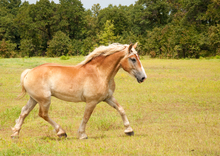Many horse owners think that the risk of tapeworms disappears during fall and winter as cooler weather arrives. Quite the opposite is true. Horse owners need to look at the entire life cycle of the tapeworm to understand their horses’ risk levels and treat them accordingly.

Understanding the life cycle of tapeworms and your horse's risk.
Horse owners sometimes think that the risk of tapeworms disappears during fall and winter as cooler weather arrives, but quite the opposite is true.
According to Hoyt Cheramie, DVM, MS, a member of the Merial Veterinary Service team, tapeworms need both a definitive host, where they mature, and an intermediate host, where they reside while in immature stages, to thrive.The horse serves as the definitive host for the tapeworm, while soil mites are the intermediate host. Mites, which can be infected with cysticeroid, larval tapeworms, are found in pastures
Once a grazing horse eats the infected mites, the cysticeroid develops into adult tapeworms in the intestine of the horse within four to six weeks. The tapeworms are then passed through the horse’s feces back into the pasture, allowing the tapeworm life cycle to continue.
Currently, there is no reliable fecal diagnostic test for tapeworm infections as there are for most other equine parasites. However, selecting a deworming product that contains praziquantel, which has been approved for the treatment of tapeworms in horses, is a way to help remove them.
Controlling tapeworms is important because studies have linked them, specifically Anoplocephala perfoliata, to spasmodic, impaction and intussusception-related colic. One study reported that 80 percent of ileal impaction colic cases examined were associated with tapeworms.
Other findings from the same study showed 22 percent of spasmodic colic cases included tapeworm infection. These infections can also result in a life-threatening condition called intussusception, which occurs when the small intestine telescopes into the cecum, resulting in a blockage that can be fatal without surgical intervention.
In addition to managing tapeworms, horse owners should control other parasites by working with their veterinarians to establish the most effective plans based on their individual horses’ needs.
More information about effective deworming strategies and ZIMECTERIN®GOLD (ivermectin/praziquantel)
About ZIMECTERIN Gold
ZIMECTERIN Gold combines ivermectin, a leading ingredient that controls a wide variety of parasites, and praziquantel, an ingredient that specifically controls tapeworms. Together, they provide excellent equine parasite control. ZIMECTERIN Gold is approved to control more species and stages of equine parasites than any other brand, including benzimidazole-resistant small strongyles. It controls 47 species and stages of equine parasites in all.
Plus, ZIMECTERIN Gold was the first dewormer approved by the FDA to effectively control tapeworms* with a single dose. Tapeworms have been recognized as a significant threat to the health of horses.
